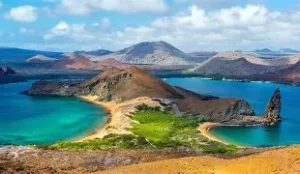
Few places on Earth inspire awe quite like the Galápagos Islands — an extraordinary archipelago off the coast of Ecuador where wildlife reigns supreme and time seems to stand still. With dramatic volcanic landscapes, pristine beaches, and unique species found nowhere else, the Galápagos offer a dream destination for nature lovers, hikers, and adventurers alike.
Thank you for reading this post, don't forget to subscribe!Whether you’re watching a giant tortoise lumber across a trail, snorkeling with sea lions, or hiking up a volcanic crater, the Galápagos promises memories that last a lifetime. Here’s your guide to experiencing the best of its wildlife encounters and coastal trails. https://youtu.be/x8hwt3Tg-mA
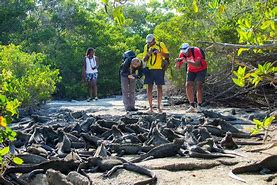
Why Visit the Galápagos Islands?
The Galápagos Islands, located about 1,000 km (600 miles) west of mainland Ecuador, are a UNESCO World Heritage Site and one of the most biodiverse places on the planet. Made famous by Charles Darwin’s work on evolution, the islands remain a living laboratory of biology — where animals have no fear of humans and dramatic landscapes tell stories of volcanic origins.
Unlike most destinations, here you’re not just visiting beaches or mountains — you’re stepping into an ecosystem where you can walk among iguanas, spot blue-footed boobies, and swim alongside marine turtles without barriers or fences.
Top Hiking & Coastal Trails in the Galápagos
1️⃣ Sierra Negra Volcano (Isabela Island)
 This hike takes you to one of the largest volcanic craters in the world.
This hike takes you to one of the largest volcanic craters in the world.
- The hike: A moderately challenging trek across black lava fields and surreal landscapes, often shrouded in mist.
- Distance: ~16 km (10 miles) round trip
- Highlights: Sweeping views of the caldera, lava formations, and occasional sightings of giant tortoises grazing nearby.
- Tip: Go early in the morning to avoid the heat and clouds.
2️⃣
Sierra Negra Volcano (Isabela Island)

One of the smallest yet most colorful islands, South Plaza offers a short but stunning hike.
- The hike: A loop trail across a rocky terrain covered with bright red and green succulents and populated by land iguanas and seabirds.
- Distance: ~2 km (1.2 miles)
- Highlights: Land iguanas, frigatebirds, swallow-tailed gulls, and dramatic cliffs dropping into turquoise water.
3️⃣ Bartolomé Island

Perhaps the most photographed spot in the Galápagos, Bartolomé offers a hike to an unforgettable viewpoint.
- The hike: Wooden stairs lead you to the summit for panoramic views of Pinnacle Rock and surrounding islands.
- Distance: ~3 km (1.8 miles) round trip
- Highlights: Breathtaking vistas, lava tubes, and lava cactus.
4️⃣ Tortuga Bay (Santa Cruz Island)

A flat, sandy trail leads to one of the most beautiful beaches in the archipelago.
- The hike: A well-maintained path through cacti and dry forest to a long, white sand beach.
- Distance: ~5 km (3 miles) round trip
- Highlights: Marine iguanas basking on rocks, sea turtles nesting, and calm lagoons for kayaking or swimming.
Wildlife Encounters You Can’t Miss
One of the greatest joys of visiting the Galápagos is its wildlife — unafraid and abundant. Here are a few encounters to look forward to:
Marine & Land Iguanas
Watch marine iguanas dive into the ocean to feed, or land iguanas sunning themselves on rocks.
Giant Tortoises
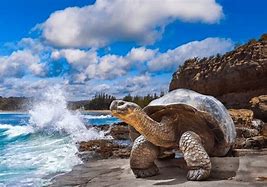
The iconic symbol of the Galápagos, giant tortoises can live over 100 years and weigh up to 250 kg. Visit breeding centers or spot them roaming wild in the highlands of Santa Cruz and Isabela.
Blue-Footed Boobies & Other Birds
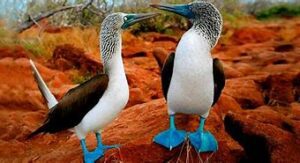
Famous for their bright blue feet and amusing courtship dance, blue-footed boobies are a highlight, along with red-footed boobies, Darwin’s finches, and flightless cormorants.
Sea Lions & Fur Seals

Playful and curious, sea lions often swim right up to snorkelers and can be seen lounging on beaches everywhere.
Marine Life

Snorkel or dive to see rays, sharks, sea turtles, colorful fish, and even penguins zipping through the water.
 Disclosure
Disclosure
As an Amazon Associate, I earn from qualifying purchases. This website also contains other affiliate links, and we may earn a small commission if you make a purchase through them — at no extra cost to you. We only recommend products and services we trust and believe will enhance your outdoor adventures. Thank you for supporting our work!

50 Must-Have Water Adventure Items
Discover the best drones and essential accessories to capture breathtaking landscapes, wildlife, and adventures across South America perfect for beginners and pros alike!
50 Best Drone Gear & Accessories
Drone Use: Know Before You Fly
Drone regulations vary widely depending on the location. Some parks, natural areas, and landmarks prohibit drones to protect wildlife, visitors, and sensitive environments, while others may allow them with certain restrictions or permits. Always check local, state, and federal rules before flying, respect no-fly zones, and prioritize safety, privacy, and environmental care during your adventure.
Explore More Adventure Hubs:
Best Time to Visit
The Galápagos are a year-round destination, but the experience varies slightly depending on the season:
Warm & Wet Season (December–May)
- Warmer temperatures & calmer seas
- Occasional showers but plenty of sunshine
- Best for snorkeling and seeing courtship displays
Cool & Dry Season (June–November)
- Cooler air and rougher seas
- More active marine life (e.g., whales, dolphins)
- Birds and sea lions are particularly active
What to Pack
You’ll be spending lots of time outdoors, hiking and on boats — so pack accordingly:
- Lightweight, quick-dry clothing
- Hiking shoes & sandals
- Hat, sunglasses & reef-safe sunscreen
- Waterproof dry bags for electronics
- Snorkel gear (optional — often provided on tours)
- Reusable water bottle
- Binoculars & camera
Getting There & Around
Most visitors fly from Quito or Guayaquil, Ecuador, to either Baltra Airport (Santa Cruz Island) or San Cristóbal Island.
From there:
- ? Transfers and boats connect the main islands.
- ? Day tours & liveaboard cruises take you to more remote areas.
- ? Some islands are only accessible on guided tours — independent exploration is limited to designated trails.
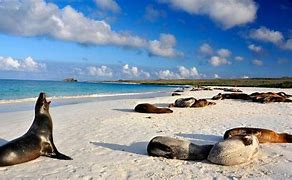
Tips for a Memorable Visit
✅ Book flights & cruises/tours well in advance — demand is high.
✅ Respect Park rules — don’t touch animals or stray from trails.
✅ Travel with a certified naturalist guide for a richer experience.
✅ Bring cash (USD) for tips, souvenirs & small purchases — ATMs are limited.
✅ Be prepared for motion sickness on boats if you’re sensitive.
Final Thoughts
The Galápagos Islands are more than just a bucket-list destination — they’re a reminder of how beautiful and fragile our planet is. With each step along a lava-strewn trail or swim through coral-filled waters, you’ll experience nature at its purest.
Take your time to hike the volcanic landscapes, watch wildlife up close, and soak in the surreal beauty of these enchanted isles. The Galápagos leave every visitor transformed — with stories, photographs, and a newfound respect for the wonders of the natural world.
So grab your hiking boots, pack your snorkel, and get ready for an adventure like no other!
¡Buen Viaje!
Leave a Reply